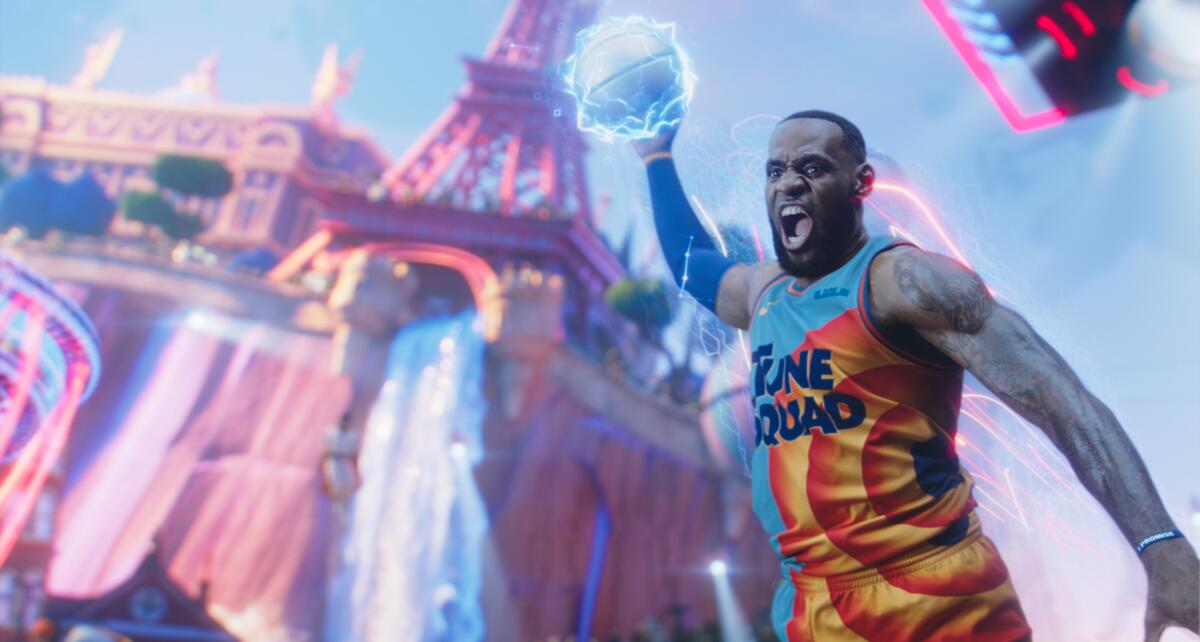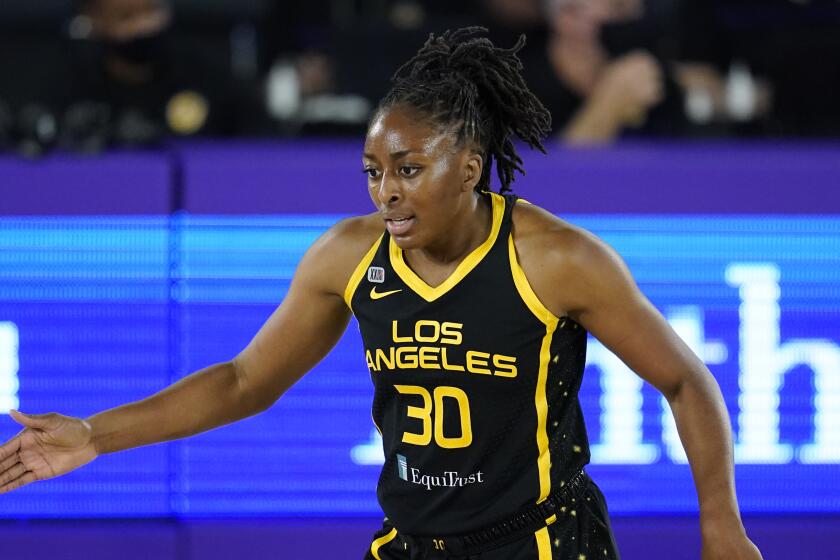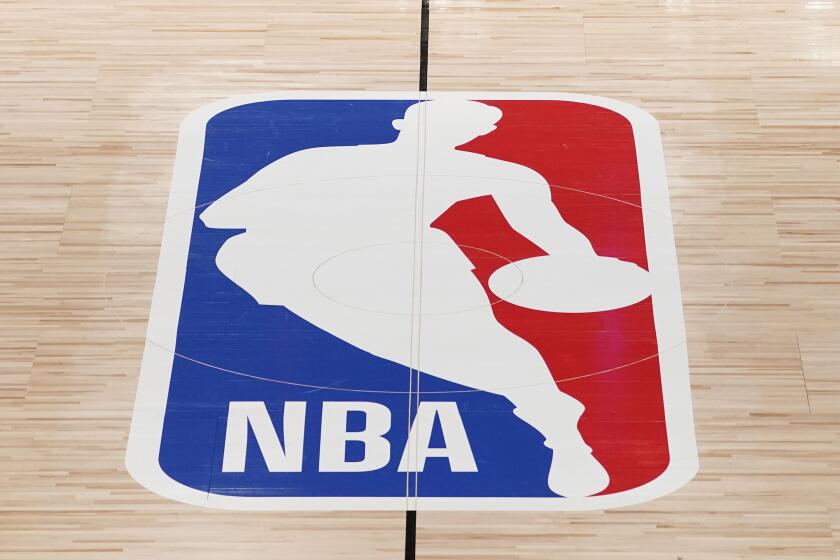Why it took 25 years to reboot ‘Space Jam’ and the many stars who nearly did

- Share via
The wait didn’t have to be this long.
“Space Jam,” starring Michael Jordan and Bugs Bunny, earned $250 million worldwide and led to billions of dollars in merchandise. It was a smash hit, one of the highest grossing films of 1996. But there was more untapped — Max Howard, a Warner Bros. studio executive at the time, said there was “great opportunity” for spinoff movies.
Howard recognized that the original film’s success wasn’t just because of the global superstar acclaim of Jordan, but also that of the Looney Tunes characters. The original could be parlayed into sequels, with other straight-man actors or athletes starring alongside the two-dimensional cartoons. Howard pitched Tiger Woods and Clint Eastwood. Jackie Chan reportedly was in negotiations with Warner Bros. to make “Spy Jam” in 2001. The same year, NASCAR driver Jeff Gordon nearly joined a project tentatively and unfortunately titled “Race Jam.”
“I know Warner Bros. was really happy with the end result of ‘Space Jam,’” said Frank Gladstone, an animation historian and director who worked on a separate WB film at the same time as “Space Jam.” “And they should’ve done it. I know they talked about it. Strike while the iron is hot, and you’ve got a franchise.”
The extent of each attempted sequel is varied and unclear. Projects fall through in Hollywood all the time. But the concepts are nonetheless fun what-ifs. And now, 25 years after the original, Warner Bros. finally has its sequel. Its delay wasn’t for a lack of trying.
This iteration, which stars LeBron James as himself and releases in theaters and on HBO Max on Friday, does things hypothetical Space Jams of the past couldn’t — or wouldn’t — have done. The world, both societally and in Hollywood, is much different now than in 1996, and “A New Legacy” reflects that.
::
Warner Bros.’ initial efforts to make a sequel were more than just a quick blip trying to capitalize on the film’s success. Howard left the studio in 1998, but in 2003 WB still was searching for a star to play the lead role with Bugs Bunny.
And in skateboarding icon Tony Hawk, they found one. Executives had a preliminary meeting with Hawk and his agent at their offices in Los Angeles, he remembers, and then again at the Encounter restaurant in the Theme Building at LAX in August 2003. Hawk was set to leave for Australia to shoot a cameo in a small independent film, but he said Warner Bros. power brokers wanted to lock him in for a sequel before he departed.
At the time, Hawk was the world champion skateboarder 12 years in a row, with a video game franchise and apparel verticals to boot. Hawk was the extreme sport’s most recognizable figure.
How soullessly mercenary can one movie be? The long-delayed follow-up to 1996’s “Space Jam” is not worth the wait.
In Encounter, Hawk and his agent looked over “Skate Jam” storyboards and a general script. The plot was similar to the original, but more edgy because of skating culture, Hawk said. He was surprised how far along the studio was in the process. His agent told him he’d be paid $1 million up front and input on who else to cast. Hawk was in.
But “Skate Jam” didn’t come to fruition. By the time Hawk returned from Australia, “Looney Tunes: Back in Action” underperformed the studio’s expectations in the box office, grossing $68.5 million on an $80-million budget. Warner Bros. was hoping “Back in Action,” starring Brendan Fraser, would put the cartoons back on the map, Hawk said.
“Back in Action” was the last feature-length Looney Tunes movie the studio put out and the only animated one until “The Lego Movie” in 2014, pointing to Warner Bros.’ lack of commitment to such films compared to powerhouses like Disney and Pixar, animation historian Tom Sito said. Hawk’s phone calls went unreturned. “Crickets,” he said.
“They didn’t want to take the risk,” Hawk said. “They wanted a guaranteed hit. With mine, anyway. I have looked back, I’ve gone down the rabbit hole of looking at ‘Back in Action’ and the timeline.”
::
Conversations about “Space Jam,” as with conversations about James, often start with Jordan. He looms over the sequel in a mythical way, and there’s even a not-so-subtle reference to His Airness in “A New Legacy.”
Shortly after the original, Jordan turned down an offer to do a sequel. Mel Brooks reportedly was in discussions to voice the villain Berserk-O, but seven weeks of acting in front of a green screen was a lot of work for the basketball-obsessed Jordan, his longtime agent David Falk said. “And that was the end of the ‘Space Jam’ franchise,” Falk said.
It was the end, until it wasn’t.
“Unlike a lot of today’s young players, I don’t think Michael had any interest in being a movie star or whatever,” Falk said. “Ironically, even though you hear today from probably a multitude of players who are building their brands, we never worked on building Michael’s brand. It was organic.”
Falk, who was a producer on the original “Space Jam,” said like all of Jordan’s business ventures, the movie was tailor-made for him. And though Falk said he’s a fan of James, as well as “A New Legacy” producers Ryan Coogler and Maverick Carter, he would have urged James to do something more original if he was managing the Lakers star.
“‘Space Jam’ worked because it was Michael’s movie,” Falk said. “That was the motivation for doing it, because it was something made for him. And other people feel that it’s appropriate to remake a movie — there’s a lot of remakes in Hollywood, let’s face it. There’s a lot of people who remake movies. I’m sure it’s going to be fun to watch, I’m sure it’ll do well, but to me, there’s only one ‘Space Jam.’”
It’s a sentiment “Space Jam” director Joe Pytka also holds. In 2016, Pytka told Entertainment Weekly he thought a James sequel was “ridiculous” and that “we’ll never see another player” as transcendent as Jordan.
But James — not Hawk, Gordon, Woods, Chan, Eastwood or Dwight Howard — rebooting the franchise is fitting. After James led the Lakers to the 2020 NBA title, he joined Jordan in a class alone in the basketball pantheon. His philanthropic efforts and activism have made him more than just an all-time player.
Ceyair Wright, a USC freshman defensive back, plays the role of LeBron James’ eldest son in the movie ‘Space Jam: A New Legacy.’
Anointed the Chosen One since high school, James has chased Jordan’s ghost for years. Now the two icons’ symmetry spills past the hardwood and into Hollywood, by design or not.
“Somebody as iconic as Michael Jordan and characters as iconic as the Looney Tunes, you can’t make that with just anybody,” said Malcolm D. Lee, director of “A New Legacy.”
“I had thought about that question: Is there anyone you could’ve made this movie with other than LeBron? I could not think of somebody over the past 25 years that could’ve happened. I think he’s so special and a once-in-a-generation player, that it would’ve been tough to have the bar raised that high. He’s the closest thing to Michael Jordan in terms of a player, as an icon, as a figure that transcends sports.”
::
There’s a moment in “Space Jam: A New Legacy” when Bugs Bunny does his patented breaking of the fourth wall. Responding to a plea from a cartoonized James determined to save his kidnapped son, Bugs says, “Hold up, Doc. So you want me, a talking cartoon bunny, to play with you, an NBA superstar, in a high-stakes basketball game? Sounds awfully familiar.”
“A New Legacy” is familiar but it’s not a carbon copy. While the sequel is true to the core of the original, it used the 25 years after the 1996 original to age and mature. It’s also openly self-aware of the Jordan film, referencing it in multiple running gags.
When the first “Space Jam” was released, the WNBA did not yet exist. In the last two and a half decades, the WNBA has grown in size, leadership structure, player compensation, media coverage and viewership. The sequel features two stars from the league in Diana Taurasi and Sparks forward Nneka Ogwumike.
Sparks star and WNBA leader Nneka Ogwumike fit in well among the stars of the movie ‘Space Jam: A New Legacy.’ A look at why.
Although Taurasi and Ogwumike are computer-generated like other “Goon Squad” members Anthony Davis, Klay Thompson and Damian Lillard, their representation matters.
“It was appropriate and necessary to include WNBA players,” Lee said. “A whole legion of young girls out there is intrigued by the prospect of playing basketball, and now they’ve got someone that looks like them that says, ‘Oh, I can do that.’”
The animation also is modernized. In the big basketball showdown, the 2D animated characters suddenly morph into CGI, video game-like avatars. Devin Crane, a “New Legacy” animation supervisor, said the style wouldn’t have been possible in 1996 because of the primitive technology.
Even the sequel’s general premise feels extremely 2021. The bulk of the plot takes place in “the serververse” — inside Warner Bros. computers where Al G. Rhythm, a humanized algorithm played by Don Cheadle, reigns. How many people in 1996 would’ve grasped those technical concepts?
In the serververse, James and the Tunes go on brief adventures through various pieces of Warner Bros. intellectual properties. They save the day in Metropolis, meet up with Granny in the Matrix, quip about Hogwarts and pick up Wile E. Coyote and Road Runner in “Mad Max.” It’s the most entertaining sequence of the film and serves as metacommentary on the rising trend in Hollywood of large-scale, crossover events and building content on top of existing intellectual property.
“It’s kind of au courant,” Lee said. “It’s of the day.”
That extended universe montage showcases the Warner Bros. library — a form of subliminal marketing for HBO Max. But it also advances the plot as the device with which James assembles his Tune Squad team to save the day. Familiar, but different.
“Space Jam: A New Legacy” isn’t a sequel that just happened to come together 25 years after its original. The time lapse opened up possibilities and became the new “secret stuff.”
More to Read
All things Lakers, all the time.
Get all the Lakers news you need in Dan Woike's weekly newsletter.
You may occasionally receive promotional content from the Los Angeles Times.










